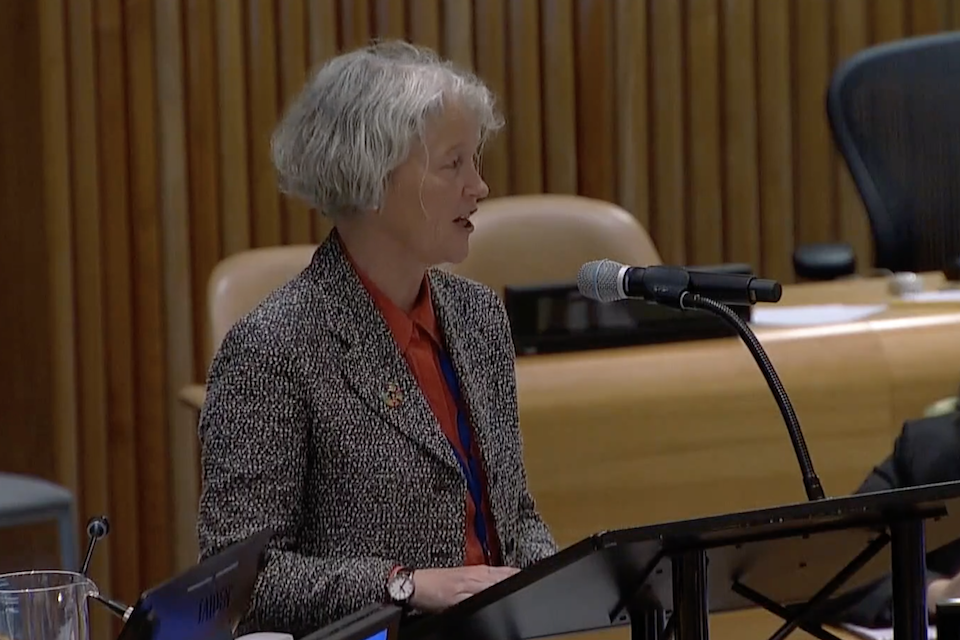We must work to ensure benefits of scientific and technological breakthroughs achieve maximum impact: UK at the UN
Statement by UK Chief Scientific Adviser Charlotte Watts at the UN Scientific, Technology and Innovation Forum

Co-chairs, Excellencies, I am delighted to speak on behalf of the United Kingdom, as co-Chair of this, the 8th Multi-stakeholder Forum on Science, Technology and Innovation for the Sustainable Development Goals.
Our meeting today comes at a critical moment on our path to 2030. We know we are off-track with progress towards the SDGs, and we urgently need to accelerate progress.
I am speaking to you now, as a senior scientist in the UK Government, whose job is to lead UK development investments in generating new innovations and evidence to tackle major challenges and make progress on the SDGs.
Many of the major steps forward in development – including to tackle poverty and increase life expectancy – have been driven by advances in technology and the use of rigorous evidence on what does and doesn’t work. However, when I think back to my first engagements with the UN, as a university professor, I remember just how difficult it was, as a technical expert, to be in the room. Despite being one of the leading experts on violence against women and girls as part of an international network of researchers, we were not invited to be part of high-level official discussions at the UN as we weren’t representing a UN Member State or accredited NGO. Ultimately, some of us did attend, but only by reaching out to our Missions for help.
As we convene this 8th STI Forum and take stock of the evidence in the SDG Review, it is really encouraging to me to see just how far we have come in bringing academic and innovation community into the conversation. But we need to continue with that progress because it is critically important that data and evidence are at the heart of UN deliberations.
Moving on now to how we can build back better from COVID-19, there is much to learn. During the pandemic, as a Chief Scientific Adviser for the UK Government, I sat on the Government’s independent Scientific Advisory Committee and saw, first-hand, how we could operate in a completely different way. In the early days of the outbreak, researchers were sequencing the genome of the virus and sharing the data; within weeks, research into the virus was being collated and made widely accessible free of charge around the world, enabling scientists to understand what we were up against. Within a month, researchers at the University of Oxford and elsewhere were adapting and accelerating vaccine platform development. Scientists around the world, like me, who were advising governments were in regular conversations –– sharing lessons, evidence and insight.
The partnerships that we forged, in a time of global crisis - government-to-government, public-private, north-south – were diverse and innovative. We sustained the necessary scientific rigour but reduced unnecessary bureaucracy in our decision-making.
Public engagement with science also shifted rapidly: in many countries, scientists were on national TV daily and became household names. Data and evidence loomed large in the public consciousness, with armchair epidemiologists emerging all over the world.
Of course, we also encountered significant challenges, which we must learn from and continue to tackle. Foremost among these was the difficulty of enabling timely and equitable global access to vaccines, as the Honourable Minister has mentioned. We were over-reliant on the centralised production of life-saving technologies. This starkly demonstrated the need for investment in regional vaccine manufacturing capability, especially in Africa. We also faced challenges of misinformation and trust in science and evidence.
As we approach the mid-way point towards the SDGs, we now need to apply this same urgency and resolve to addressing the interlinked and increasing crises the world faces, including to tackle climate change and make more rapid progress on achieving the SDGs.
The good news is that we are witnessing nothing short of a revolution in science, technology and innovation. Several technologies are coming of age and inspiring an explosion of innovation – from artificial intelligence to engineering biology – generating high-impact applications across all SDGs. The exponential development and adoption of these technologies will transform our world. But we know that this transformation will not automatically be equitable or deliver positive impact at scale.
There is the risk that countries compete over access to resources, talent, investment and technologies and that the benefits of advancements are not accessible to all. As a scientist, I want to stress the importance of resisting the temptation to be closed. Scientists and researchers, from all around the world know that scientific and technological innovations progress most quickly, and have greatest impact, through collaboration: where researchers trust each other, can collaborate easily, and when their work is accessible and shared around the world.
That is why the UK is delighted to partner with South Africa as co-Chair of this important Forum. This is an important opportunity to come together, not only to review progress in science and innovation but also to take the necessary actions to ensure the benefits of innovation can be felt by all.
I look forward to the discussions ahead and hope that, as the world grapples with complex interlinked crises, we can mobilise to accelerate progress to achieving the SDGs, with a commitment to working in partnership. I urge you all to leave this conference with the resolve to work together to ensure that the benefits of scientific and technological breakthroughs, and our innovations, are broadly distributed, widely felt, and achieve maximum impact, in support of the delivery of the bold SDG agenda for 2030.
Thank you.